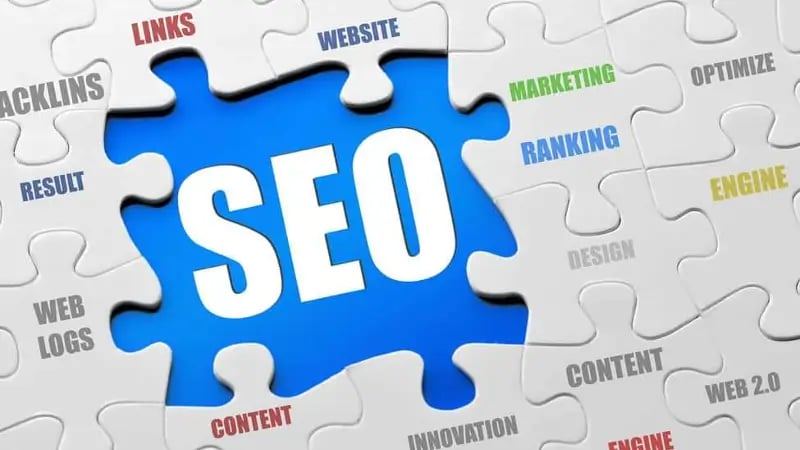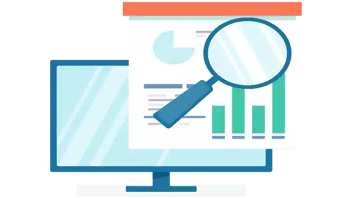Unlock SEO success: Learn how we use HubSpot Content Hub for SEO, boost rankings, increase organic traffic, and optimize our content for success.
SEO for Startups: How to Improve Your Website's Search Engine Ranking
Unless a member of your target audience has heard explicitly of you, they won't be searching for you by brand name. The most common way they'll look is by using a search engine. Search engine optimization (SEO) shouldn't simply be an afterthought but part of your startup business plan from Day One - Launch.
SEO is how you get your website to appear higher on search engine results pages (SERPs). Ideally, by optimizing your website, you'll make it more visible to anyone who needs what you can provide. SEO achieves this by optimizing each website page, using keywords developed from extensive keyword research efforts, and earning inbound links.
Getting started with SEO has numerous benefits, besides finding out that I am waaay more online than average:
-
The average, non-startup, non-marketing person spends about 13 hours a week online, and some 93% of online experiences begin with a search engine, with Google triggering the bulk of those. 3/4 of users never scroll past the first page of search results.
-
67% of businesses say SEO is important to their overall marketing strategy, experiencing SEO to increase website traffic by up to 500% and looking to SEO
-
generate leads and sales;
-
improve their brand reputation.
-
As a core element of Inbound Marketing, SEO is a long-term investment that can pay off in the long run, yet it should be an essential part of any startup's marketing strategy.
In 2023, Google is the dominant search engine with a market share of over 92% in the global online search market. This means that out of every 100 people who use a search engine, 92 use Google. The next most popular search engine is Bing, which has a market share of around 2.8%. Other popular search engines include Yahoo, Yandex, and Baidu.
- Google's search algorithm is constantly being updated to improve the quality of its results.
- Google also has a large index of websites, allowing it to provide more relevant results for most queries.
- Finally, Google has a large user base, meaning it has more data to train its search algorithm and improve its results.
Google's dominance in the online search market has several implications for businesses:
-
Businesses need to make sure that their websites are optimized for Google searches to be found by potential customers.
-
They must be aware of the competition from other businesses trying to rank high in Google search results.
-
SEO efforts must be cognizant of the changes Google makes to its search algorithm to keep its website index up-to-date. This impacts constantly changing elements, including title tags, keywords, image tags, internal link structure, backlinks, Core Web Vitals, etc.
You should clearly define your SEO business goals before you go any further. Exactly how you design your SEO strategy depends on what you hope to achieve; is it all about boosting brand visibility, or is it about generating demand, or are you focused on driving targeted leads? Once you establish your SEO business goals, you can move on to the next steps.
The need to generate quality content is common to virtually all SEO strategies. You want to attract links to your content and generate repeat traffic. First, provide helpful information and answers to questions your potential audience has. Then you convert that audience to followers, who will come to you when they’re ready to purchase goods and services.
So, you need a topic-generation process to develop an editorial calendar full of relevant, planned content.
Determine what your customers, or potential customers, want.
You can't just start a blog and hope people find it. Content marketing means creating helpful content that will attract your target audience. You must identify popular and engaging topics in your field and create content to address those topics.
You can start by jotting down what you believe would be likely keywords in someone's search for answers to questions you can answer. Then Google searches for those words and sees what similar and related phrases pop up repeatedly. Start to type a query into the search box using a keyword and see what autocomplete results come up. These are alternative terms people have used in their searches.
Speak to customers as often as possible and note the language they use. Doing so lets you learn how they talk about your niche, what problems they are encountering, and what they hope to find to address them. This helps you refine the keywords you've identified using Google search results and keyword tools.
Once you have the keywords you want to rank and an idea of what searchers expect when they enter those search terms into Google, you need to assign the keywords to the pages on your site. Create a map that ties each keyword in your plan to a page on your site.
You might also like:
Optimize your web pages for target keywords.
The next step in your SEO strategy is on-page optimization. Here are some tips:
-
Use short, descriptive URLs that naturally include your target keyword or phrases from long-tail keywords.
-
Create meaningful meta titles and descriptions that search engines use when showing your page in SERPs.
-
Use headers and subheaders to make searching and categorizing your content easier for search engines. This also helps your human readers.
-
Describe and explain your images in their alt tags to help the search engine understand what they are.
Be sure your website is accessible to both search engines and people
-
Make sure your website loads fast. If it doesn't, people will click away.
-
Ensure your site is mobile-friendly. You can use a tool like Google's Mobile-Friendly test tool in Google Search Console.
-
Install an SSL cert since HTTPS is a signal used by Google to rank sites.
-
Create a sitemap so search engines can use it to find your content and understand how your pages are connected. These don't directly affect rankings but allow the engines to find and index new pages faster.
-
Strategic linking of specific pages and posts can increase the speed at which your site is crawled while pointing the crawlers to your most important pages. Linking also helps your target audience find easily and intuitively what they may be searching for.
Backlinks are your Best Friend
One of the factors with a significant influence on Google's ranking algorithm is backlinks. Backlinks are links from other websites back to yours. You must commit time and resources to promote and generate links to your carefully produced content.
Follow these basic rules and turn guest blogging into a tremendous brand-building tool, generating referral traffic and improving rankings.
- Publish on a respected website with a relevant audience.
- Create content that is helpful to the audience of this identified authoritative website.
- Link to resources on your website that will help the other website's audience expand their knowledge.
Measure your SEO success.
The last step in setting your SEO strategy is deciding how you will track your performance. Test, measure, and improve your SEO results. There are a lot of methods and what seems like an infinite number of metrics you can use, so be selective. Core metrics that should be part of your considerations:
- Keyword rankings: This metric tracks how high a website ranks for specific keywords in search engine results pages (SERPs).
- Organic traffic: This metric measures the number of visitors who come to a website from search engines.
- Bounce rate: This metric measures the percentage of visitors leaving a website after viewing only one page.
- Time on page: This metric measures visitors' average time on a website.
- Pages per session: This metric measures the average number of pages visitors view during a single session on a website.
- Conversion rate: This metric measures the percentage of visitors who take a desired action on a website, such as purchasing or signing up for a newsletter.
Optimizing your website for search will pay off over time. It will get you more and more traffic as long as you're consistent with your implementation.
This content is also available in:
- German: SEO für Startups: Wie Sie das Ranking Ihrer Website verbessern
- Spanish: SEO Startups: mejora ranking web
- French: SEO pour les startups : Comment améliorer le classement de votre site
- Italian: SEO per le startup: Come migliorare il posizionamento del vostro sito
- Romanian: SEO pentru startup-uri: Cum să îmbunătățești clasamentul site-ului tău
- Chinese: 初创企业的搜索引擎优化:如何提高网站的搜索引擎排名











Leave a Comment